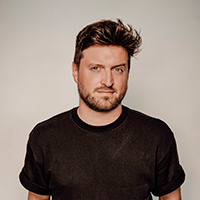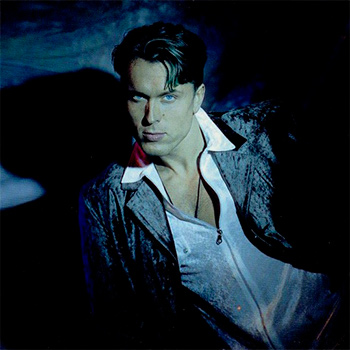

Chris Liebing is a German DJ, producer, and one of the key engineers of the techno sound of the past three decades: from the hard industrial groove and loop-driven thrust of the late 1990s to the atmospheric, song-oriented work on Mute in the 2010s and 2020s. Founder of the CLR label, host of the weekly show AM/FM, a fixture at major festivals, and a resident at leading techno venues across Europe and the Americas. He was born on 11 December 1968 in Gießen (Hesse, Germany).
Early years and formation
-
In the late 1980s–early 1990s, Liebing began his DJ career in central Germany. His taste was shaped by Frankfurt’s techno school and the era’s “heavy” Ruhr scene.
-
Alongside DJing, he moved into promotion: organizing his own nights and building a local community around him — that bond with the room and “his” audience became a stylistic constant throughout his career.
Labels, projects, and media
CLR
In 1999, Liebing launched CLR — a platform that quickly turned into a “forward base” for European techno: releases by Chris and kindred artists, a unified visual code, and a high sonic standard. In the 2000s, CLR became synonymous with a dense, “steel” groove — functional yet engineered with precision.
Stigmata and Collabs
-
Stigmata (with Andre Walter, 1999–2002) — a cult 12″ series that codified the tough, industrially springy late-’90s pattern. These records are often cited as a touchstone for schranz aesthetics and high-energy techno DJing.
-
Collabs 3000 — Metalism (with Speedy J, 2005) — a full-length where studio micro-engineering meets live impact; one of the benchmark albums of “big” mid-2000s techno.
Podcasts and radio
-
In the 2000s, CLR also became a media hub: the weekly CLR Podcast brought a whole wave of new-school artists to a wider audience.
-
Since the mid-2010s, Liebing has hosted his own weekly show AM/FM — a continuous curve of his DJ thinking: recordings of club and festival sets focused on dramaturgy and dance-floor energy.
Turning to the album format: working with Mute
In the latter half of the 2010s, Liebing showcased broader authorship on Mute:
-
Burn Slow (2018) — a slow-burning, atmospheric album with song structures and a pull toward ambient, post-industrial textures, and minimalism. Here Chris works not only with “drum machinery” but with voice, silence, and spatial fabric.
-
Another Day (2021) — a continuation of that line: warm analog timbres, melancholic melody, and carefully sculpted low end; the record broadens the view of Liebing as a sound designer beyond club pressure.
DJ philosophy and sound
-
Groove architecture. His signature: loop-motor rhythms, micro-step evolution, and the ability to lead a crowd through gradual build-ups and releases of tension.
-
An engineering mindset. In his sets, Liebing works like a systems engineer: balancing massive bass with readable mids, maintaining mix dynamics, and placing accents in transitions so the club acoustics can “breathe.”
-
Hybridism. At the controls he freely combines digital and hardware tools, re-assembling tracks in layers to create a live, here-and-now feel.
Scene, clubs, and festivals
Since the early 2000s, Chris has been a regular at Time Warp, Awakenings, Movement Detroit, ADE, and other flagship events. You can hear him at leading venues in Berlin, Amsterdam, London, Paris, Madrid, Buenos Aires, and New York. He’s often billed for extended sets — a format in which his dramaturgy shines.
Curator’s role and mentorship
In the 2010s and 2020s, Liebing has systematically supported young producers: releasing them on CLR, inviting them onto AM/FM, and booking them into his nights. His curation is less about trends than standards: energy, clarity of ideas, and sound quality.
Legacy and influence
-
Standardizing hard techno. The Stigmata series and key CLR releases set a long-lived template: a resilient industrial groove without unnecessary “dirt” or “fireworks,” where timing and the traction of the pattern do the talking.
-
Bridging club and album perspectives. The Mute records proved that a dance-floor “engineer” can author deep, meditative works without losing identity.
-
A media ecosystem. Through his label and weekly shows, Liebing strings a “pearl thread” through the scene, connecting generations and geographies.
Selected discography (listener’s guide)
-
Albums/LPs: Burn Slow (2018), Another Day (2021).
-
Collabs/projects: Collabs 3000 — Metalism (with Speedy J, 2005); the Stigmata series (with Andre Walter, 1999–2002).
-
Mixes & radio: the weekly AM/FM archive; historic episodes of the CLR Podcast.
Conclusion
Chris Liebing is a rare artist equally at ease in the machine heart of the dance floor and in contemplative studio work. He helped standardize the language of hard, loop-driven techno, grew a community around CLR and AM/FM, and then proved that techno engineering can speak in “large,” album-scale forms. Today Liebing is more than a DJ or producer — he’s an architect of the scene: he sets sonic parameters, mentors new voices, and, performing on the world’s main stages, continues to test his ideas by the ultimate criterion — the energy of the room.







